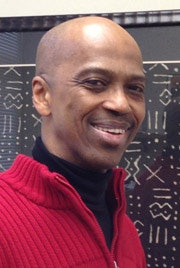 Dr. Rubin Patterson
Dr. Rubin PattersonWhen it comes to how industry treats the environment, Black communities have been dumped on more than others for years, and scholars who deal with the Black experience in their classrooms haven’t done nearly enough as they should to stop it.
That is one of the main arguments that Dr. Rubin Patterson, a professor and chair of sociology and anthropology at Howard University, makes in his Greening Africana Studies: Linking Environmental Studies with Transforming Black Experiences (Temple University Press).
Brownfields and “LULUs” — or locally unwanted land uses — proliferate in the figurative backyards of Africana programs in cities throughout the country, Patterson shows in his book.
He posits that, if more scholars who deal with the Black experience also started to tackle these issues of the environment, it could potentially encourage more Black students to pursue jobs and careers in which they could work and to fight to make Black communities less hazardous, healthier and more habitable.
“Africana studies has gone from being arguably the most progressive field in the academy to one giving little attention to an area that not only has had a punishing impact on the black community but is on the cusp of a potentially great transformation: from destructoindustrialism to eco-industrialism,” Patterson writes.
“Even business schools have green MBA programs,” Patterson observes. “Africana studies should be developing progressive green curricula.”
Of the thousands of courses that students can take in Africana studies, only 28 undergraduate courses and six graduate courses deal with the environment, Patterson found.
Similarly, Patterson found that only about 1 percent of all articles published in the three leading Africana journals — Journal of Black Studies, Black Scholar and Western Journal of Black Studies — dealt directly with environmental matters.
For Patterson, the fact that Africana programs devote such precious little to one of the most important issues that confront the Black populace — that is, the toxic conditions that exist in the neighborhoods where large numbers of Black people in the United States dwell — represents a “lost opportunity.”
On that note, it’s important to point out that Patterson is not only a preacher of the green gospel, so to speak, but an actual veteran of efforts that he is calling for to make Africana studies greener.
“The program I directed at the University of Toledo was among the first, if not the first to give environmental challenges and opportunities in the black community — primarily in the United States and Africa — a central position,” Patterson states.
Among other things, the Toledo program worked with community-based organizations to do brownfield remediation, urban agriculture and environmental awareness efforts.
Patterson doesn’t just dream green. He takes a hard and critical look at why so few Black students in Africana studies are pursuing environmental careers.
For instance, he notes prior research that shows how even within the sphere of environmental matters, Black and White students take divergent paths. Specifically, Black students are less likely to express an interest in working for mainstream environmental organizations, while White students are less likely to express an interest in working in environmental justice organizations.
Black students were also more likely to say they were willing to work in corporations upon graduation, Patterson notes of pioneering research by Dr. Dorceta Taylor at the University of Michigan.
Black students as a whole are, Patterson notes, much like America itself, conflicted and consequently pursue divergent ends. You might say they are, like any other group, torn between fighting for a greener environment as opposed to jockeying for the type of “green” that they can pocket.
“Some aspire to status-laden and materially rewarding careers,” Patterson writes. “But some are drawn toward Africana studies for its social missions, its alternate way of understanding society, and its unique opportunities for self-discovery.”
Patterson not only sees a role for Africana studies to play in educating and inspiring students, but for equipping them with the technical speak and expertise needed to navigate a range of environmental issues on which they could work if motivated to do so.
But Patterson doesn’t subscribe to all of the hype surrounding the prospects of green jobs in the short run.
Despite all the hoopla about solar energy, for instance, and all the programs that have trained young people to work as solar panel-installers — one of the most commonly cited “green jobs” — the average person among us doesn’t even know anyone who uses solar energy, much less use solar energy ourselves.
“I agree with the staunch pessimists that the abundance of green jobs that advocates have written about since 2000 is unlikely to occur,” Patterson says of the short term. “I am nevertheless bullish on the significant availability of green jobs in the longer term because, if we are to avoid future environmental collapse and a human catastrophe, there will have to be substantial green production and sustainable consumption, which will require an abundance of green workers.”
Patterson’s book is one of the most sobering looks ever taken at the need for Africana scholars and programs to recognize and respond to the need to cultivate a new generation of students that possesses the consciousness and skills needed to make the environment better for Black people — a challenge that will undoubtedly also prepare them to make the environment better for the world.


















